#character: intertwined
Text

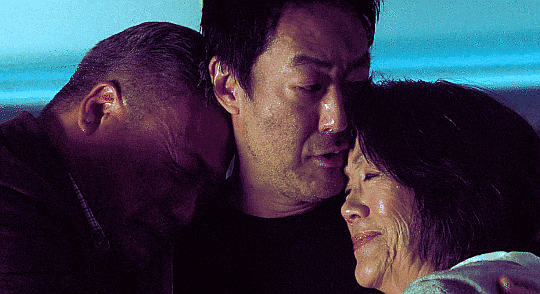


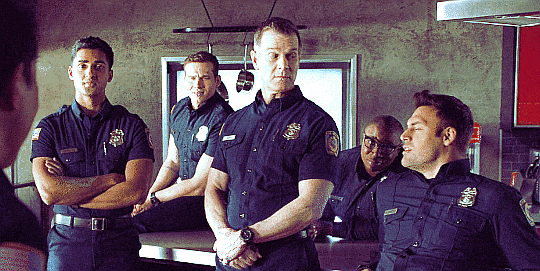
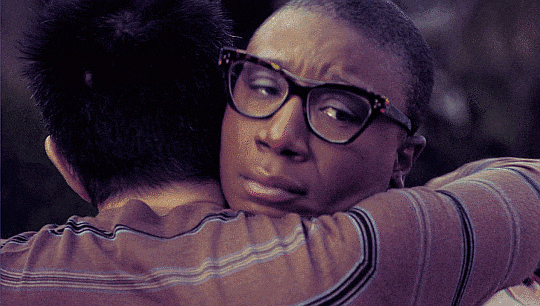


#911 abc#911edit#chimney han#911 gifs#madney#kevin lee#maddie buckley#glmdedit#jee yun buckley han#albert han#henrietta wilson#karen wilson#john lee#anne lee#eddie diaz#evan buckley#ravi panikkar#bobby nash#look i hope people are as emotionally damaged by this as i was making it#we only had kevin for like 25 mins but i've never gotten over him#this guy has every reason to be a horrible miserable character but no#no he's the coolest cheeriest funniest caring man alive#sick dead mom at a young age and abandoned by an absent father and taking care of sick after her diagnosis#ideas constantly shut down for owning a business and losing his brother on the job#and also sorta losing mr lee who couldn't bear to see him without being reminded of kevin bc they were so intertwined#failing in love and getting stabbed and left for dead#oh and the rebar accident where he almost died again#losing the love of his life and then finding her but not being together with her
719 notes
·
View notes
Text
Very interesting to me that a certain subset of the BES fandom's favourite iterations of Mizu and Akemi are seemingly rooted in the facades they have projected towards the world, and are not accurate representations of their true selves.
And I see this is especially the case with Mizu, where fanon likes to paint her as this dominant, hyper-masculine, smirking Cool GuyTM who's going to give you her strap. And this idea of Mizu is often based on the image of her wearing her glasses, and optionally, with her cloak and big, wide-brimmed kasa.
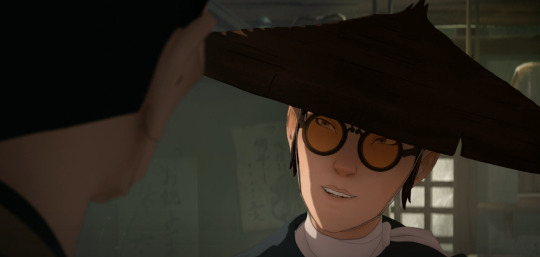

And what's interesting about this, to me, is that fanon is seemingly falling for her deliberate disguise. Because the glasses (with the optional combination of cloak and hat) represent Mizu's suppression of her true self. She is playing a role.

Take this scene of Mizu in the brothel in Episode 4 for example. Here, not only is Mizu wearing her glasses to symbolise the mask she is wearing, but she is purposely acting like some suave and cocky gentleman, intimidating, calm, in control. Her voice is even deeper than usual, like what we hear in her first scene while facing off with Hachiman the Flesh-Trader in Episode 1.
This act that Mizu puts on is an embodiment of masculine showboating, which is highly effective against weak and insecure men like Hachi, but also against women like those who tried to seduce her at the Shindo House.
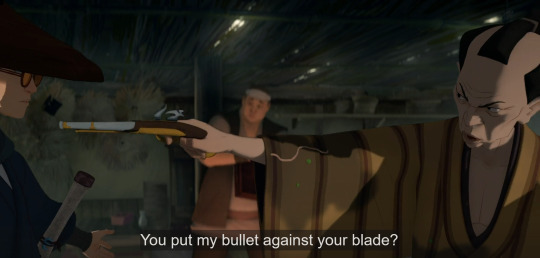

And that brings me to how Mizu's mask is actually a direct parallel to Akemi's mask in this very same scene.
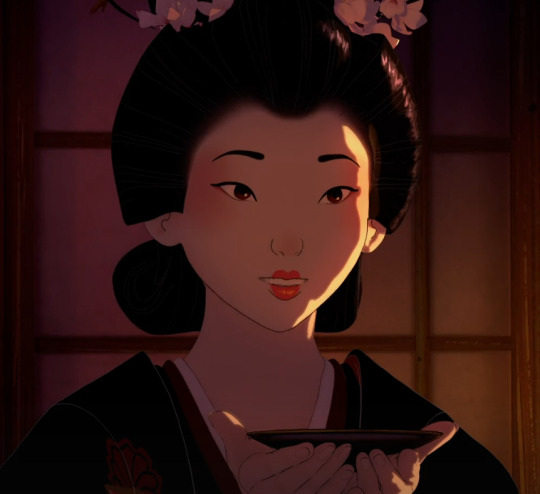
Here, Akemi is also putting up an act, playing up her naivety and demure girlishness, using her high-pitched lilted voice, complimenting Mizu and trying to make small talk, all so she can seduce and lure Mizu in to drink the drugged cup of sake.
So what I find so interesting and funny about this scene, characters within it, and the subsequent fandom interpretations of both, is that everyone seems to literally be falling for the mask that Mizu and Akemi are putting up to conceal their identities, guard themselves from the world, and get what they want.
It's also a little frustrating because the fanon seems to twist what actually makes Mizu and Akemi's dynamic so interesting by flattening it completely. Because both here and throughout the story, Mizu and Akemi's entire relationship and treatment of each other is solely built off of masks, assumptions, and misconceptions.
Akemi believes Mizu is a selfish, cocky male samurai who destroyed her ex-fiance's career and life, and who abandoned her to let her get dragged away by her father's guards and forcibly married off to a man she didn't know. on the other hand, Mizu believes Akemi is bratty, naive princess who constantly needs saving and who can't make her own decisions.
These misconceptions are even evident in the framing of their first impressions of each other, both of which unfold in these slow-motion POV shots.
Mizu's first impression of Akemi is that of a beautiful, untouchable princess in a cage. Swirling string music in the background.
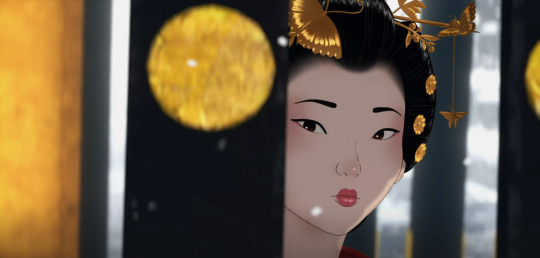
Akemi's first impression of Mizu is of a mysterious, stoic "demon" samurai who stole her fiance's scarf. Tense music and the sound of ocean waves in the background.

And then, going back to that scene of them together in Episode 4, both Mizu and Akemi continue to fool each other and hold these assumptions of each other, and they both feed into it, as both are purposely acting within the suppressive roles society binds them to in order to achieve their goals within the means they are allowed (Akemi playing the part of a subservient woman; Mizu playing the part of a dominant man).
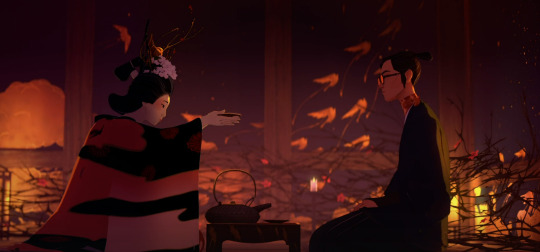
But then, for once in both their lives, neither of their usual tactics work.
Akemi is trying to use flattery and seduction on Mizu, but Mizu sees right through it, knowing that Akemi is just trying to manipulate and harm her. Rather than give in to Akemi's tactics, Mizu plays with Akemi's emotions by alluding to Taigen's death, before pinning her down, and then when she starts crying, Mizu just rolls her eyes and tells her to shut up.
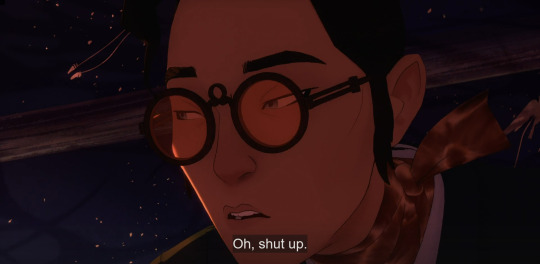
On the opposite end, when Mizu tries to use brute force and intimidation, Akemi also sees right through it, not falling for it, and instead says this:
"Under your mask, you're not the killer you pretend to be."
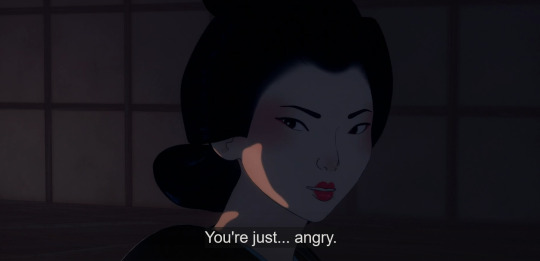
Nonetheless, despite the fact that they see a little bit through each other's masks, they both still hold their presumptions of each other until the very end of the season, with Akemi seeing Mizu as an obnoxious samurai swooping in to save the day, and Mizu seeing Akemi as a damsel in distress.
And what I find a bit irksome is that the fandom also resorts to flattening them to these tropes as well.
Because Mizu is not some cool, smooth-talking samurai with a big dick sword as Akemi (and the fandom) might believe. All of that is the facade she puts up and nothing more. In reality, Mizu is an angry, confused and lonely child, and a masterful artist, who is struggling against her own self-hatred. Master Eiji, her father figure who knows her best, knows this.
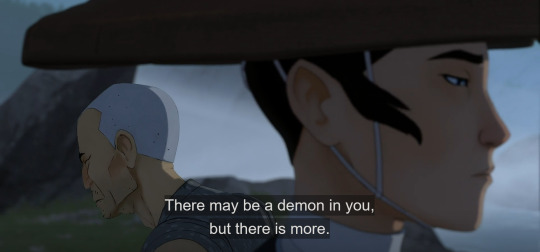
And Akemi, on the other hand, is not some girly, sweet, vain and spoiled princess as Mizu might believe. Instead she has never cared for frivolous things like fashion, love or looks, instead favouring poetry and strategy games instead, and has always only cared about her own independence. Seki, her father figure who knows her best, knows this.
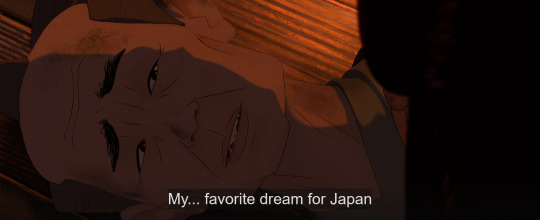

But neither is she some authoritative dominatrix, though this is part of her new persona that she is trying to project to get what she wants. Because while Akemi is willful, outspoken, intelligent and authoritative, she can still be naive! She is still often unsure and needs to have her hand held through things, as she is still learning and growing into her full potential. Her new parental/guardian figure, Madame Kaji, knows this as well.
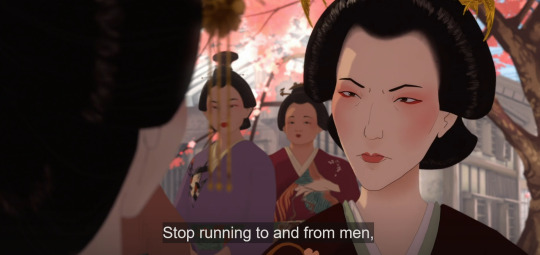
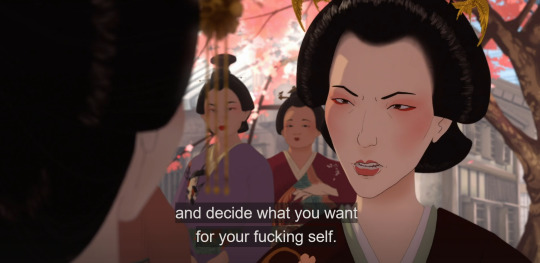
So with all that being said, now that we know that Mizu and Akemi are essentially wearing masks and putting up fronts throughout the show, what would a representation of Mizu's and Akemi's true selves actually look like? Easy. It's in their hair.
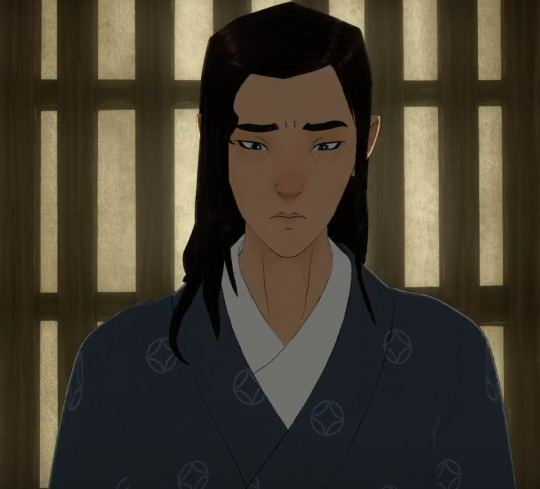

This shot on the left is the only time we see Mizu with her hair completely down. In this scene, she's being berated by Mama, and her guard is completely down, she has no weapon, and is no longer wearing any mask, as this is after she showed Mikio "all of herself" and tried to take off the mask of a subservient housewife. Thus, here, she is sad, vulnerable, and feeling small (emphasised further by the framing of the scene). This is a perfect encapsulation of what Mizu is on the inside, underneath all the layers of revenge-obsession and the walls she's put around herself.
In contrast, the only time we Akemi with her hair fully down, she is completely alone in the bath, and this scene takes place after being scorned by her father and left weeping at his feet. But despite all that, Akemi is headstrong, determined, taking the reigns of her life as she makes the choice to run away, but even that choice is reflective of her youthful naivety. She even gets scolded by Seki shortly after this in the next scene, because though she wants to be independent, she still hasn't completely learned to be. Not yet. Regardless, her decisiveness and moment of self-empowerment is emphasised by the framing of the scene, where her face takes up the majority of the shot, and she stares seriously into the middle distance.
To conclude, I wish popular fanon would stop mischaracterising these two, and flattening them into tropes and stereotypes (ie. masculine badass swordsman Mizu and feminine alluring queen but also girly swooning damsel Akemi), all of which just seems... reductive. It also irks me when Akemi is merely upheld as a love interest and romantic device for Mizu and nothing more, when she is literally Mizu's narrative foil (takes far more narrative precedence over romantic interest) and the deuteragonist of this show. She is her own person. That is literally the theme of her entire character and arc.
#blue eye samurai#mizu blue eye samurai#akemi blue eye samurai#blue eye samurai meta#just in case... im gonna tag this as#mizukemicritical#akemizucritical#though this post isnt actually criticising the ship itself but rather fanon's portrayal of the ship and the characters#for that reason lemme also tag this as#wank.mp3#feel free to disagree of course but please be civil#and if you need to rant about how wrong i am without any convincing evidence kindly feel free to make your own post. peace and love <3#fandom.rtf#meta dissertations.pdf#shut up haydar#edit: for full disclosure. i do rather dislike this ship. but obviously it's fine for anyone to enjoy it. please do! have your fun!#it's just that as usual! popular fanon and fandom around a ship is what has completely deterred me from any sense of enjoyment of it#it's a shame too because i was very open and even eager for some mizu/akemi romance in the future#but out-of-character fanon + the rudeness of certain fans has definitely soured it for me#but that doesn't mean people can't enjoy it obviously! ship and let ship!!!#plus it has its appeal which i DO STILL see and enjoy!!!!#i would even go as far as to call them soulmates because their narratives and characters are LITERALLY intertwined!!!#but. yeah. my gradual distaste for this ship is indeed very unfortunate.
662 notes
·
View notes
Text
do you ever think about how cass is everything steph wants to be heroically and steph is cass’s reminder for why she is a hero
#stephcass#their character archs are so beautifully intertwined with each other#they cannot escape each other narratively#stephanie brown#cassandra cain#fran talks
205 notes
·
View notes
Note
Your Jake is literally my favorite Jake *ever*, oh my god he's so cute. I get so fucking hyped whenever I see a new post from you. Your art *never* disappoints.
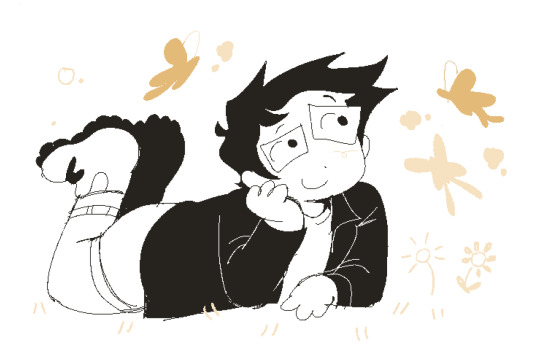
A little doodle just for you as thanks! 😁
My fav girly gay of all time.. Im so glad so many people love my design for him he is my pride and joy as with my other alpha kids :3 Its an honour to have mine be your fav 🙏🙏
BUT THANK YOU!!!! Im so happy my arts nice enough to make people excited for more 🥰 all your tags are what makes posting worth it!!!!
#jake english#my art#meoware#daniel talks#Jake english and being the boy who stops to smell the flowers you get what i mean. His gay coding intertwined with his aspect visuals-#Is so fun and beautiful to me as like queer expression and the integral queer core of his character. IDK MAN. love this guy 🫶
132 notes
·
View notes
Text
holy shit, this post just made something click for me.
both will and mike’s arcs have revolved around being separated from each other again and again and again.
every season they’re torn apart in some way, and one of them is desperately trying to get the other back—s1 physically, s2 spiritually, s3 emotionally, and again in s4 by physical distance…
yeah, their arcs are woven together and it went totally over my head. their happy ending is each other. it’s written this way.
#i can’t believe this is real life???#byler#even mike’s arc…….yes el is a part of it bc she’s a main character too and their arcs are intertwined to an extent#but el spends most of her screentime each season dealing with the UD/lab/powers related stuff#not her relationship with mike#but nearly all of mike’s screentime away from el revolves around will and whatever current separation byler is facing#yeah holy shit. holy shit#el’s arc is about finding and accepting herself starting to heal her trauma & finding her real family#byler’s arcs are about falling in love. plain and simple#mike’s arc having two parallel love stories going on……….one with el and the other with will……….it’s done narratively on purpose to draw#attention to mike’s experience w romantic love#we’re supposed to be paying attention to that#i have chills.#narrative tag
1K notes
·
View notes
Text
i do like regulus and enjoy various ships and friendships with him in. but pls. he is not a marauder. pls don't replace peter with him. i mean i think i liked it more when people just left him out rather than replacing him with regulus. like sure, you can make him friends with them if you really want, but don't just blur peter out and slot regulus in there. peter deserves better <3 like sure peter did dumb shit he shouldn't have but so did regulus alright? and peter is actually a marauder, not regulus. sirius, james, and remus are actually making grabby hands to peter because they want him back and regulus has left them to go read about true crime. like,, honestly cannot imagine regulus even playing a prank. he'd hate that kinda stuff. whilst peter lives for it,, cause he's literally a marauder. y'know at this point i'm just gonna shove peter and regulus together and make them snog and make up.
#i mean obviously hc whatever you want btw!! i'm just stating my frustrations#like if you take peter out the marauders then it takes such a huge part of them away. and such a huge part of all their characters#because they're so intertwined and connected etc etc#but then the current thing i keep seeing with regulus replacing him as a marauder????? what????#hate it. hate it. hate it. hate it.#they don't have to compete love. just give peter his friends back and let peter and reg kiss and make up#and then all is grand again#marauders era#marauders#peter pettigrew#regulus black#peter/regulus
52 notes
·
View notes
Text
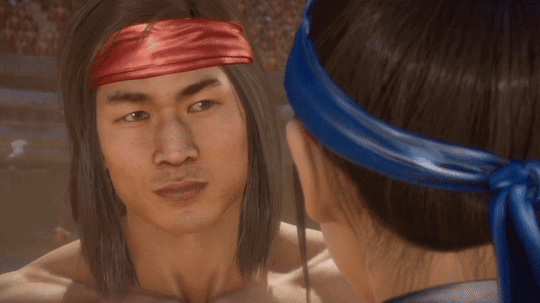
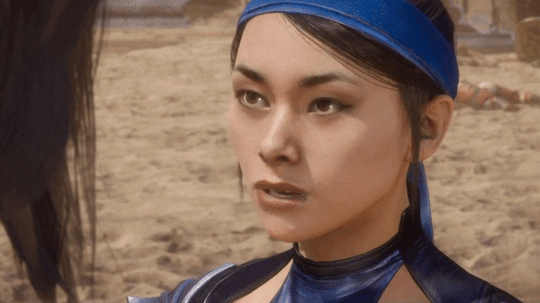




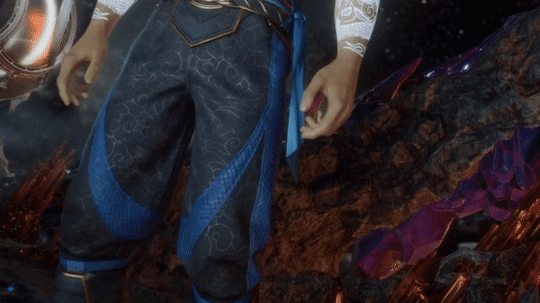
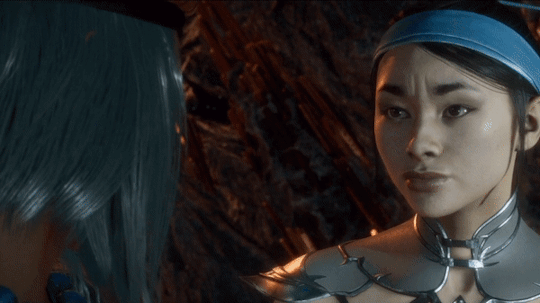
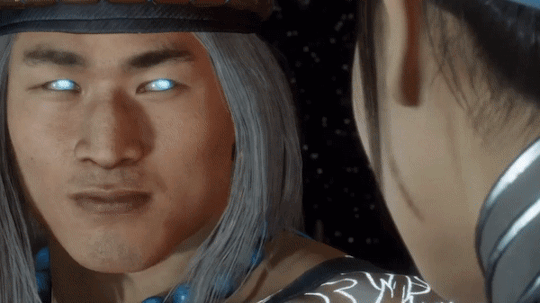
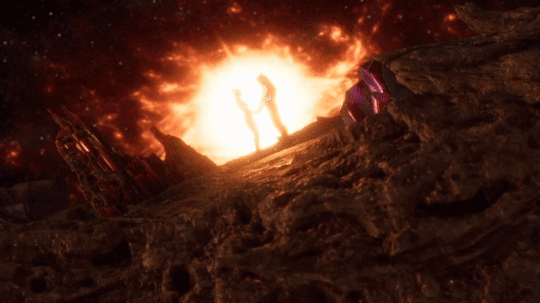
Fire God Liu Kang & Kitana Kahn in Mortal Kombat 11
#Crimson's Gifs: Mortal Kombat#Mortal Kombat#Mortal Kombat 11#MK#MK11#Kitana#Kitana Kahn#Princess Kitana#Liu Kang#Fire God Liu Kang#Liutana#Liu Kang x Kitana#Kitana/Liu Kang#Pairing: Your Destinies Have Always Been Intertwined#Theme: Characters With History#Theme: The One That Got Away#Theme: Morally Sound#Theme: The Heroes
225 notes
·
View notes
Text


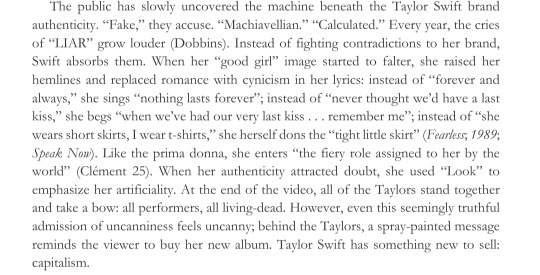


When Divas Rise from the Dead: Taylor Swift, Uncanniness and Capitalism
#tangential to my thoughts on a modern diva which is: can one truly exist in this climate? taylor gets close in some ways#but her Character is deeply intertwined with her public performance of life and YET it is also undeniably a performance.#something very Ready Built Diva as a means of success in the reality economy but lacking a true Divahood...#lit#a day in the life
132 notes
·
View notes
Text
i know chase obviously wins the religious trauma competition but can we please talk about how foreman was not only raised by a deeply religious father, but was most likely raised BAPTIST. no wonder he’s so repressed. the baptist experience is like. you’re in church every sunday listening to a man scream about how love is something that should hurt. you believe in a good, loving god - but to believe, you have to accept that true love is painful. that to be a good person, you must suffer. to love is to endure it, to work mercilessly. you’re not worthy of the love of The Almighty, and you never will be, and that sense of unworthiness is fundamental to having faith. when you sin, you don’t just hurt Him, you hurt everyone around you. you make the world worse because you have dared commit the sin of existence — to be human is to be sinful. to be loved is to feel unworthy and pathetic and hopeless. like YEAH no wonder foreman self isolates and is emotionally closed off. he was taught from BIRTH that he is fundamentally unworthy of love, and that in accepting love, he is also accepting that he truly is worthless.
#also#i really cant stress enough to non-americans that foreman being black would seriously have had an impact on his relationship with religion#christian ideals are baked into the way racial justice is thought about in the blm movement of today#christianity is also by and large more significant to black americans than it is to white americans because of this#because race and religion are really intertwined#and idk its not. the MOST important aspect of foreman’s character or anything#but i think it’s a lot harder to Get him if u don’t have that cultural knowledge which most americans will inherently understand#also disclaimer im not black. never been to a black church so obviously i cant speak to that experience#however i did go to a baptist school growing up and they REALLY emphasized that i should be ashamed of being alive#obviously this is all me theorizing bc foreman could be some other flavor of protestantism#they’re all varying levels of traumatic tbh#if he was episcopal he probably was listening to people speaking tongues in church which just. yeah. that also really fucks u up#house md#eric foreman#house md hc#house md headcanon#dr foreman
118 notes
·
View notes
Text
thinking about how akio sees his younger self in utena and wondering if there's any fondness there. doesn't change the horror of what he does to her obviously but i do wonder
#akio and utena#m#long ramble in the tags sorry:#the thing about akio is that he's so evil bit he's also so human#he has feelings. i just don't know what they are (if anything) toward his victims#he loves anthy at the very least i'm sure of that. even if he hates her too. just like she loves and hates him. the lines are blurry.#and i just. i have to wonder whether any of that extends to utena at all. we know anthy at times feels similarly about utena and dios#(and akio by extension.) the simultanious love and resentment. so it's not too unlikely i think.#like. even though he never had anything but bad intentions in getting close to her#i'm not sure it's possible to do everything he did and feel nothing#not that he has any meaningful amount of guilt or remorse for it. i don't think that.#and i obviously don't think he “loved” her in any of the ways she might have thought he did#but did he not care at all? did he not feel any kind of fondness or sympathy or just. idk. pity? for her?#whatever the case it wasn't enough to reconsider having her killed so you know. how much does that actually matter anyway#idk. i think about it a lot. how abusers are rarely entirely indifferent toward their victims#the role he's playing in her life is so fucked up but it IS a role he's playing and i wonder how much he you know... internalizes it?#how much does he believe the illusion of family that he invites her into? because akio DOES often buy into his own illusions.#(similarly i think it's possible that akio is fond of touga too. their mentor-protégé relationship is horrible and abusive#but that doesn't make it less real. you know? maybe real is the wrong word.)#when he talks in episode 25 about wanting utena and anthy closer that's obviously so he can continue to groom her#but is there something genuine there too? i don't know.#again. it obviously does not make anything he does better or even different. but it is interesting to think about to me.#on the other side of that coin does seeing his own past youth and naivete and desire to do good that he (maybe) once had#reflected back at him through her mean anything?#is there resentment there? that she is what he couldn't be? or more likely he just thinks that idealism is stupid.#either way it's something he wants to take from her. anyway ramble over.#i talk a lot about utena's feelings toward akio (familial vs romantic love and the way the two are intertwined in fucked up ways)#but not much the other way around. probably because utena is actually a sympathetic character whose feelings the show very clearly#wants you to analyze and think about.#which is... less true for akio i think. though he's still a complex character with complex motives. he's just harder to get a grasp on.
37 notes
·
View notes
Text
“kazuha would hate scaramouche.”
do you really think that kazuha’s story quest being about the whole “i’d rather see him recognise and atone for his mistakes that see him punished for them” was a coincidence? or how we were helping kazuha put together bits and pieces about his ancestry? or how scara spared kazuha's relative during the fall of the raiden gokaden upon noticing kaedehara yoshinori’s appearance and his connection to the niwa clan? niwa whom scara called: my family… my friend.
kazuha wouldn’t hate scaramouche because accepting the past and moving on is such an important part of his character. in his story quest he says: "but to make this arduous journey, you committed countless atrocities, and showed a blatant disregard for human life. even if you were to sever that divine light, is this truly the outcome your maker would have desired? […] this person (blade) has committed unforgivable atrocities but only because it lost its original master. no one was there to correct its errors when it was losing its way." tell me this could not easily be applied to scara. kazuha has demonstrated this incredible capacity for forgiveness countless time. (for example: his voice line about raiden; “do i simply resent the raiden shogun because of what happened in that duel? […] i’ve thought about this a good long time, and i believe the answer is no.” and later on he only talks about his “dissatisfaction” with her. he never uses the word hate.)
when kazuha found out what happened during the fall of the raiden gokaden he said: “knowing the truth behind what happened is enough for me, […] that being said, if the enemy from all those years ago is still lurking and plotting to stir up more trouble, then i definitely won’t turn a blind eye.” — while he put what happened in the past behind him, if kunikuzushi/scara were to pose a threat in the present kazuha would act because he believes that: “what’s most important for each person is not the past, but the present.”
look i completely understand that some people just don’t enjoy the ship and that is totally understandable but saying kazuha would hate scara is just not true to his character.
#i said it before and i will say it again their narratives are mirrored#you don’t have to ship two characters to recognise their importance for each other’s development#they might not have interacted yet but their paths have been intertwined together a long time ago#kazuscara#kazuha x scaramouche#kaedehara kazuha#kazuha#scaramouche#scara#kunikuzushi#genshin#genshin lore#kryoxie
448 notes
·
View notes
Text
Fushiguro Megumi, Shadow seen through the lens of Zen Buddhism:
[wherever there is light, there is shadow; wherever there is length, there is shortness; wherever there is white, there is black. just like these, as the self-nature of things can not exist alone, they are called non-substantial. - buddha]
➠ Megumi & the illusion of I and not I:
Within Zen philosophy, shadows are often interpreted as elements of mystery, the unknown, and impermanence, and represent the veiled aspects of existence that transcend human understanding. Much like impermanence, they are ever-shifting and constantly changing, mirroring the transient nature of life itself. At the same time, shadows are inseparable from light and their interplay reflects the interconnections and interdependencies of all things.
It is no different when it comes to a self. The shadow is not separate from a self, it is the very idea of a self.
It is important to note that Buddhism rejects the notion that the self is a permanently existing unchanging individual entity and sees the concept of self, ego, as a product of consciousness, which arises in a sentient being as part of the process of living i.e. consciousness itself is, at any moment in time, dependent on many things that are always changing, and consciousness itself is always changing, hence so too does the conceived self (when I use the term ‘self’ from here on, I am referring to the ‘conceived self’).
Another important thing to note is that Buddhism transcends dualistic concepts such as ‘Good vs. Evil’. It is the heart of Buddhism that Enlightenment sets one free from such false dichotomies, and from the cycle of suffering altogether.
However, when the Shadow, the unknown self, is not integrated into the self as a whole, one fails to recognise the non-dual nature of existence and may end up with a sense of ‘Goodness’ or ‘Rightness’. You separate the world as you separate the self, to attain gain from defining yourself and the world in a dualistic way. We see Megumi separate the world as such, the Good and the Bad or the Right and the Wrong. He integrates his entire sense of justice into the concept that helps him navigate the world in the most convenient way for him. He does not confront himself nor his ideals (although, he starts to, when he crosses paths with Yuuji, who does not truly fit his perceived idea of ‘Goodness’, but he justifies it, by laying the blame not only on Yuuji, but upon himself). Throughout the manga, it is clear that Megumi fears his Shadow (and the potential that lies in facing it), because he is afraid of what might peer back at him from the dark if he stands face to face with that part of his self (i.e. what if his perceived notions are wrong altogether).
However, what Megumi fails to recognise is that he loses his true sense of self by diving the world into ‘Good’ and ‘Bad’, and therefore, struggles to place himself in either of the categories. Tsumiki is good, so she must live a life free of suffering (or fairly). Yuuji is good, so he deserves to live. Where is Megumi’s place on that scale of ‘good’ and ‘bad’? He is not as good as his sister, he is not as kind as Yuuji, so of what value is his life? But on the other hand, he is not as bad as for example, Sukuna is, so his life cannot be completely worthless. Instead of seeing reality and accepting it for what it is, Megumi clings to his conceived idea of how the world (or people) is ‘supposed’ to be and it leaves him in a stalemate. He stays standing where he is, because he cannot imagine himself standing anywhere else.
In that same sense, he separates himself from his Shadow. For Megumi the Shadows are not a truly innate part of himself (an essence of being), but merely a Technique. A way for him to protect his perceived ‘Good/Right’ from ‘Bad/Wrong’ and because he cannot fit himself in either of the categories (not good enough or not bad enough), he cannot see himself as anything other than a tool. The world he has to navigate feeds onto his notions. In a way, Megumi has always been a tool, within the world of sorcery or outside of it, on an interpersonal level (but this depends on how one regards his relationships with Tsumiki and Gojo for example) and so, he continues to regard himself and his technique as such.
Megumi struggles to see beyond what is conscious, but the Shadow is what lies beyond his consciousness. Therefore, he has a hard time understanding himself and his technique on an innate level, because he can only see that which is conscious, the rest remains hidden in the Shadow, influencing his behaviour, creating reactive patterns within him, and distorting his perception of reality.
There is a concept called Non-dual Awareness in Buddhism, which refers to an awareness that transcends firm distinctions between oneself and the rest of existence. This is what we see Megumi struggle to cultivate throughout the manga when it comes to his technique (and sense of self). In a state of non-dual awareness, one understands that one is inseparable from the entire process of reality. Imagine you are standing in front of an ocean, looking at a single wave, is the wave still an ocean? The wave may have its own distinct properties, but it is also still clearly the ocean, i.e. it is both itself and the ocean at the same time. Such is the case with human beings. We are our individual selves, but we are also continuous with the particles that constitute everything in the known universe. Undertanding such, Buddhists see that selves are fuzzy and cannot be neatly defined. There is no objective boundary at which I end and the rest of reality begins.
➠ liberation:
How can Megumi reconcile with his Shadow, that unknown self?
The process of liberation within Buddhism is largely a process of gradually embodying the truths of non-duality and no-self, while learning to let go of your individual preferences, desires, expectations, and attachments. Through this process, we come to participate more fully and compassionately in our world, let go of fear, and accept the endless ebb and flow of all things. We resist nothing.
The way to liberation is to become an observer, a witness of your own mind. For Megumi to embrace his ‘full self’, he must embrace the impermanence of life (and therefore, self). And I believe where Akutami is leading him through all his suffering is that path of awakening, where Megumi is the Shadows and the Shadows are him.
To be continued...
[Disclaimer: This is only a personal opinion as just another reader. Additionally, English is not my native language and I have never read JJK in English, so certain terminologies I use may not be the correct equivalent of the English language.]
#i wanted to expand on different philosophical schools and how their concept of shadow intertwines with the buddhist idea of what shadow is#but this got longer than i expected so i will continue in the next part...#i just really hope akutami doesn't disappoint with what comes for megumi's character.#fushiguro megumi#jjk#jujutsu kaisen#megumi fushiguro#itadori yuuji#yuji itadori#fushiguro tsumiki
36 notes
·
View notes
Text
literally freaking out over an akishinji fanfiction where they bring in 13 year old kanji from persona 4 and akihiko and shinjiro become the older queer male role models that i think kanji desperately fucking needs
there’s no chance in hell atlus would ever write a story like this but god. GOD. i wish so badly that kanji could’ve gotten this in game. the party members in p4 make kanji feel like garbage for how they perceive his sexuality, and seeing an alternate universe where he finally gets people to show him that yes, it’s perfectly normal to be queer, is so goddamn cathartic.
#persona#persona 3#persona 4#akishinji#kanji tatsumi#also like#i think for kanji specifically it would be very helpful to see very hyper masculine guys like aki and shinji be in love#obv there’s nothing wrong with gay ppl who align w stereotypes#but since kanji’s character is so intertwined with what it means to be a man#having gruff and tough shinjiro tell him that it’s ok to be himself felt very meaningful to me
45 notes
·
View notes
Text

Do you believe in soulmates?🎀
Game by: @crescencestudio
#mintheart#oc#original character#visual novel#vn#mc#main character#intertwine vn#intertwinevn#intertwine van
110 notes
·
View notes
Note
I feel like I missed something, what is Asterism?
Hi! Aaaaaa I guess I never explained it in an accessible way, I talked about it during livestreams but it's not like these are out there forever
Looooong story short, my best friend is a writer! Additionally they are my confidant and know the plot of The Clockmaster, my webcomic, through and through.
So! I commissioned them to write me a Clockmaster fanfic(?) based off of the Superhero Au that we cooked up. My friend is a bit of a perfectionist and very diligent when it comes to their craft and they spent a year writing this story. It ended up being 42k (I comissioned them for 10k)!
42k is literally the length of The Great Gatsby, so I suggested that we should toootally print it and make a book out of it, just for ourselves as a memento. They let me draw the cover for it!
Asterism is the title of the story! :)
So tl;dr Asterism is a 42k The Clockmaster fanfic written by my best friend
I am so so lucky to have been born just in time to be this person's best friend. Also it feels weird calling it a fanfic? It's a custom made work of art for my eyes only, my golden chalice, my black diamond, the divine balm for my brain and ambrosia for my eyes-
#MY CONFIDANT MY EDITOR MY BEST FRIEND OUR SOULS ARE INTERTWINED WE WILL FIND EACH OTHER IN EVERY UNIVERSE THEY MAKE LIFE WORTH LIVING#ITS SO. ITS SO IN CHARACTER!!!#THEY GET ORION!!!#THEY GET GARRET..............!!!!!!!!!!!!!!!!!!!!#THEY WROTE IT AND DREW 3 CUSTOM COVERS FOR IT FOR EACH CHAPTER BECAUSE THERE ARE 3 CHAPTERS IN THE STORY!!!!!!!!!!#asterism#tcm#the clockmaster
46 notes
·
View notes
Text
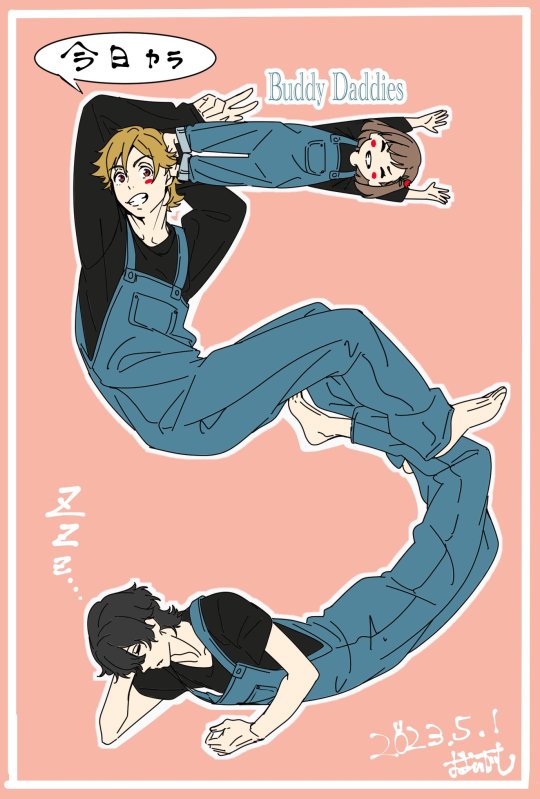
Lily “It's already May ~”
#buddy daddies#anime#MATCHING CLOTHES#Rei is just sleeping LOL#Kazuki how is he the hotest and also the cutest character EVER?!?!?!#Miri's feet on his head#Rei and Kazuki's legs are intertwined <3
142 notes
·
View notes